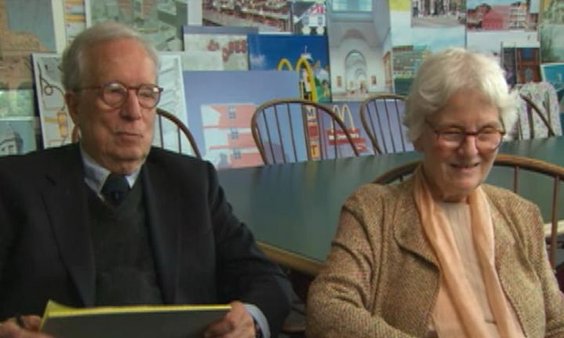NEXT STORY

Architecture as flexibility; form follows functions
RELATED STORIES

NEXT STORY

Architecture as flexibility; form follows functions
RELATED STORIES


|
Views | Duration | |
|---|---|---|---|
| 111. Paranoia and bad reviews | 45 | 01:14 | |
| 112. Problems with developers | 36 | 03:33 | |
| 113. Why we went to work in China | 48 | 02:23 | |
| 114. Getting older | 61 | 00:50 | |
| 115. Beethoven, Milton and changes in the kind of work we get | 46 | 04:09 | |
| 116. Why we are misunderstood | 1 | 89 | 01:19 |
| 117. Salesmanship | 44 | 03:37 | |
| 118. Interviews | 53 | 03:22 |

[RV] When we were being interviewed for the new cathedral for the Archdiocese of Los Angeles, by the cardinal of Los Angeles, and halfway through the interview I felt we weren’t doing so well but I’d decided I better say to him that he should know that I am the son of the first and probably the only Italian American Quakers. And then about 10 minutes later in the interview Denise got across that she was Jewish. And I love saying, somehow we didn’t get the job. Actually, we had a second interview and in that I was able to get across that my mother’s first cousin was a bishop, but that didn’t make up for what I’d said earlier. But, anyhow, so we’re not, we’re not… I’m not terribly good at this kind of stuff.
Do you feel sometimes, you have a penchant for saying exactly the wrong thing?
[DSB] No, he had to say those things.
Just in general, do you think?
[RV ] I don’t think so, no, I don’t think I’m a twerp. But, I’m not… but I’m just not… I don’t like being dishonest or fooling people. I like to be straightforward… knowledge complexity.
[DSB] You know, I have sometimes been on the other side of the table and I have watched my colleagues be interviewed. They don’t do so well and even when they’re smooth they make the mistake of not getting the sense of the client. And they make people mad, because they’ve said the wrong thing. And so, no one’s wonderful in that respect and that goes for some of the biggest architects I’ve seen in that context. And the truth is that you can have an absolutely lousy performance and if people want you they’ll make all kinds of excuses for you.
[RV] Exactly, I remember going for an interview in Philadelphia for a job and saying at the beginning, ‘You know, I should advise you that the architect who makes the worst impression during these interviews, is the one you should choose because an architect who’s a good salesman, is probably not very good in terms of being an architect’. They laughed and in the end we didn’t get the job, but no one got the job because it evidently fell… fell apart. But there’s something to that. I think, very often a good salesman is not a good producer worker.
Bill Bowen has said that he’s had to, when you were trying to get the work at Princeton, he had… you often gave a bad presentation to the Trustees compared to the other architects and he had to convince the other Trustees and say that it’s not who gives the best presentation it’s who’s going to design the best building.
[DSB] Yes.
So, even in your most successful venue, Princeton, there’s no point in having the interview. If you say well it doesn’t matter when the interview is, they’ve had to do that, so.
[DSB] They have their procedures and some of them are laid down. If they have federal funding, the procedures are laid down that they must go through. They can’t just say we think we’ll have Robert Venturi, because we like him best. They have to interview three architects and there has to be a competitive interview process and, etce, etc. So, they must do it and they want to do it, because they have fiduciary responsibilities and there’s all these reasons to make us go through hoops, which they don’t enjoy and we don’t enjoy.
Internationally renowned architects Robert Venturi (1925-2018) and Denise Scott Brown (b.1931) have helped transform contemporary design through their innovative architecture and planning. Winners of numerous prestigious awards, their designs have championed multiculturalism, social activism, symbolism, pop culture, history and evolving technologies.
Title: Interviews
Listeners: Thomas Hughes
Thomas Hughes is Mellon Professor Emeritus of the History of Science at the University of Pennsylvania and Distinguished Visiting Professor at the Massachusetts Institute of Technology. His most recent books include Human Built World, Rescuing Prometheus and American Genesis. He is a member of the American Philosophical Society, US National Academy of Engineering, Royal Swedish Academy of Engineering Sciences and the American Academy of Arts and Sciences.
Duration: 3 minutes, 22 seconds
Date story recorded: 22nd to 23rd September 2006
Date story went live: 27 May 2010